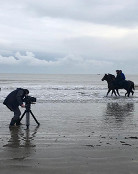Donn's Articles » Cheltenham and the Irish
Cheltenham and the Irish
Remember 1989? It really isn’t that long ago.
There were no Irish-trained winners at the Cheltenham Festival in 1989. Galmoy had single-hoofedly prevented a whitewash for the previous two years. In winning the Stayers’ Hurdle in 1987 and in 1988, the John Mulhern-trained gelding stood alone as the only Irish-trained winner at each of those festivals. But when Rustle thwarted his bid for the hat-trick in 1989, the Irish challenge was extinguished. No Irish winners. Blank. We went home with our tails between our legs.
These things can turn around quite quickly. Just three years earlier, Buck House had won the Champion Chase and Dawn Run had raised the roof in the Gold Cup. To go from that high to no winners was to fall from the roof of the new grandstand to the ground.
These days, different story. Only twice in the last 11 years have there been fewer than seven Irish-trained winners at Cheltenham, and there hasn’t been fewer than five since 2004. Of course, there are more races now than there used to be, there are 27 races now where there used to be 18. However, as a proportion of the total, the Irish performance has never been higher.
Four times in the last five years, there have been 12 or more Irish winners. Three times in the last five years, the score has been 13-13 going into the final race, the decider. Thirteen British-trained winners, 13 Irish-trained winners, one race to go. In 2011 and this year, a British-trained horse won the last, the Grand Annual Chase. But in 2013, AP McCoy booted the Tom Mullins-trained Alderwood home, and brought the Irish tally to 14, one more than the British tally.
This shift has not happened by accident. Irish trainers could always train National Hunt racehorses, but Ireland was a nation of sellers. Back in the 1980s, if a young Irish horse won a bumper or a point-to-point, it was usually impossible for the owner to resist British suitors brandishing fat cheques. If those horses proved to be good enough to compete at Cheltenham, they were competing as British-trained horses, despite the fact that they had been bred in Ireland.
It is difficult to pinpoint exactly when the shift began, but perhaps it started with Willie Mullins and continued with the Celtic Tiger. When Mullins rode Wither Or Which to a 20-length victory in a bumper at Leopardstown’s Christmas Festival in 1995, the ensuing offers were inevitable. At that point, Mullins had to decide: are we sellers or are we racehorse trainers?
He determined the latter, and he and Robert Sinclair retained the horse. Willie himself rode the Welsh Term gelding in the 1996 Champion Bumper and, one of just four amateur riders against 20 professionals, drove the horse to a two-length victory.
The landscape has undergone a seismic change since then. Irish trainers are still among the best in the world at what they do, but now there are enough Irish and Irish-focused owners around to allow the good Irish horses stay in training here.
The top five owners in Ireland are pivotal. Gigginstown House, JP McManus, Susannah Ricci, Barry Connell and Ann & Alan Potts. Their contribution to the Irish National Hunt scene cannot be underestimated. Add Andrea & Graham Wylie and Patricia Hunt. Of course, not every trainer in the country benefits from the top owners’ involvement, and some owners concentrate on one or two trainers, but three of the top owners – Gigginstown House, JP McManus and Barry Connell – have their horses spread among a smattering of trainers.
Of course, Mullins was dominant at Cheltenham last week. Just as you could not have thought that there would ever be more Irish-trained winners at Cheltenham than British-trained winners, you never could have thought that an Irish trainer would have eight winners at one Festival. More than any other trainer, ever, British or Irish. But it hasn’t happened overnight. We have been building towards this. Mullins has been leading trainer at the Festival for four of the last five years now.
But other trainers got on the board. Gordon Elliott, Tony Martin, Dermot Weld, Enda Bolger, and a first Festival winner for Mags Mullins. And while owners Susannah Ricci and Gigginstown House and JP McManus and Barry Connell between them supplied eight of the 13 Irish-trained winners, five other Irish-facing owners got on the board.
The young horses excelled. The most exciting performances of the week were put up by young Irish horses. Three of the four Grade 1 novice hurdles – the Supreme, the Neptune and the Albert Bartlett – were won by an Irish horse, as were all three Grade 1 novice chases – the Arkle, the JLT and the RSA Chase. Also, Irish horses filled the first three places in the Supreme Novices’ Hurdle, the Albert Bartlett Hurdle, the Champion Hurdle and the JLT Chase. It was just one of those weeks.
Four of the top five horses in the betting for the 2016 Gold Cup are Irish-trained, while three of the top four in the betting for the 2016 Champion Hurdle are Irish-trained. The future looks decidedly bright.
The Berlin Wall fell in 1989. Actually, maybe it is quite a while ago.
© The Sunday Times 15th March 2015


 Follow Donn
Follow Donn